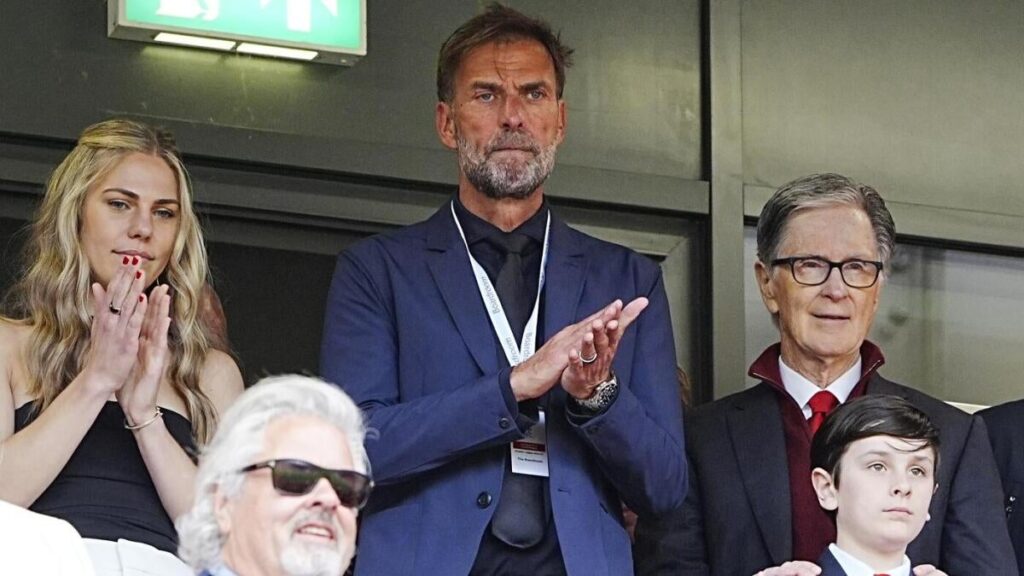Jurgen Klopp criticized soccer governing bodies like FIFA and UEFA for adding more competitive matches to the calendar in recent years, worsening a fixture congestion issue that many argue endangers player welfare.
Klopp, now the head of global soccer for Red Bull, singled out several competitions over the course of a wide-ranging interview with CBS Sports, leading with the new-look Club World Cup that took place in the U.S. last summer. The competition was expanded from eight teams to 32, much to the ire of figures like Klopp who have dealt with the consequences of player fatigue.
“The physical part is really, really tough for the players,” Klopp said. “Paris [Saint-Germain] had a few injuries, Chelsea has now injuries, too many. Let me see, who was in the Club World Cup final? Ah, Chelsea against Paris! Surprise! It’s just too much but the big story’s not out there yet and talking and bringing the Club World Cup together with that situation and I don’t want to jinx it. I’m not a witch. I just tell you from all my experience, we cannot do it like that constantly.”
Klopp essentially boycotted the Club World Cup over the summer and admitted, “I survived easily without watching one game.” He did not tune into Red Bull Salzburg’s matches at the tournament, either, even though the team now falls under his purview since joining the energy drink company in January. Salzburg were eliminated in the group stage after facing Real Madrid, Mexico’s Pachuca and Saudi Arabia’s Al-Hilal.
“No. They were a bit angry about that. I’m actually usually not that straight but this,” he said before banging on the table, “I really felt you cannot do it, stop it but I can’t say what I want. It’s better I talk to my microwave because more impact.”
The former Liverpool manager also hit out at a recent proposal by CONMEBOL to expand the 2030 World Cup to 64 teams to celebrate the tournament’s centennial, though FIFA is reportedly not considering the idea.
“In that moment, when they play all these games, the discussion comes up with 64 teams for a World Cup,” Klopp said. “Is that from April to August or what type of tournament is that? Who plays against who? … They cannot get enough. They cannot get enough and that’s not great.”
Klopp traced the scheduling concerns back to the UEFA Nations League, the first iteration of which began in September 2018, stacking international breaks with competitive fixtures rather than a series of friendlies between national teams. UEFA has partially linked the Nations League to their tournaments to qualify for the Euros and the World Cup, though Klopp argued it adds undue pressure to elite players and national team managers alike.
“The thing is, you cannot rotate the best players in the world,” he said. “I was —in Germany, I’m not sure you say it here as well – on the trees, angry, when they started the [UEFA] Nations League. [UEFA president] Mr. [Aleksander] Ceferin, I think he liked me until I went for UEFA. Now, no friendly games anymore. That sounds like, why do we have friendly games? Because it’s nice! They played, they can prepare, whatever, we don’t need a competition.”
During his days coaching Liverpool, Klopp said his players were unable to manage their minutes during the international break because of what he described as the Nations League’s farcical competition rules.
“I asked, ‘Does he really have to go? He played that many games,'” Klopp said as he recalled past conversations with national team coaches. “X, Y and Z national coach told me, ‘If he’s not playing, we lose and then we get downgraded to Nations League B.’ I said, ‘There’s another one? Are you kidding me? Where’s that coming from? You can get relegated in Nations League?’ Just stop it. … Really, [there’s] so many things they could do differently.”
Klopp’s comments are the latest on the topic, which has risen to become one of the most important issues in the modern game. The ex-Liverpool manager joins the likes of retired player and current CBS Sports analyst Thierry Henry, who also piled criticism on FIFA and UEFA for the additional competitive matches on the schedule during the UEFA Champions League pre-match show on Wednesday.
“For me, it’s pretty simple,” he said. “It’s not about complaining and it’s not about saying players earn too much money or debating. It’s about having an educational discussion with the players’ union – a proper one, not with the ex-players. Don’t call me, UEFA. Do not call me, FIFA. I’m not playing anymore. I don’t know how it feels anymore. I know how it felt, I don’t know how it feels anymore so speak to [Virgil] van Dijk, speak to Mo Salah. … Sit with them. Have a discussion with them. They are the actors right now.”

